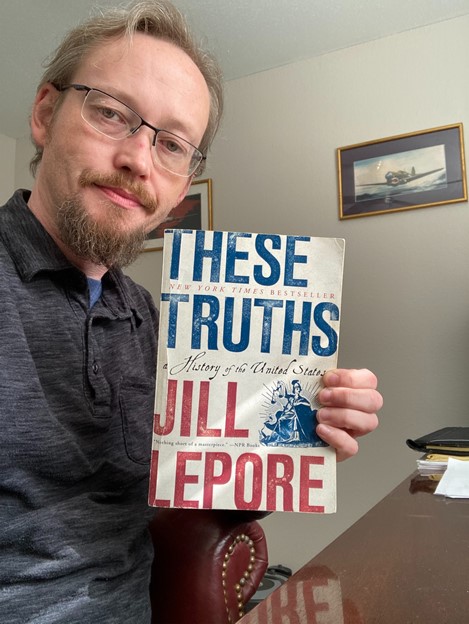Book Club - Call for Content
The Democracy Day - Empowering Action seeks to create a fun dynamic, and eventually interactive, resource for students, faculty, staff, and citizens with a regularly updated book club. Our goal is to provide lasting resources from the SHSU academic community of curated books coming from a variety of disciplines. The common theme of all submitted books should be democratic life and practice. Every month (week if there are enough submissions) DD social media and websites will feature a contributor with a book they feel is important for understanding democracy both here and abroad. The end goal is to create a curated resource of important works, both contemporary and classic, that interested parties can browse to learn more about democracy, its history, practice, and importance. Please see the example below.
Each contribution must include the name of the contributor, bibliographical information for their selected book (in MLA or APA), a maximum of 500 words about why they’d recommend the book, and up to 3 subject tags for cataloging and search. Contributors should also include a short bio about themselves and an email address (optional). If they want, and we recommend, they can include a picture of them with the book in question. Submissions will be taken on a rolling basis and there is no deadline. This is also an excellent opportunity for graduate students to practice their writing skills for public consumption. To submit please send a word doc with the required information to ddbookclub@shsu.edu. After receipt and acceptance you will receive a message informing the contributor of when the content will go live. We look forward to seeing your submissions.
Example

In These Truths Jill Lepore, a Harvard historian and journalist, takes us on a journey through American history from 1492 to the present. The book is similar to older sweeping histories of American history, like those in your old textbooks. Where the book creatively deviates is in its framing. As the title suggests, Lepore’s primary concern is how Americans have understood political, economic, and cultural truth throughout the nation’s history. These truths defined who was worthy of human consideration, what we know about our fellow citizens, and even the basic facts of the world. Lepore reasons that understanding these truths is essential for understanding America historically and contemporarily. The key question of the Constitutional Convention, Lepore explains, was “Can a political society really be governed by reflection and election, by reason and truth, rather than by accident and violence, by prejudice and deceit?” Exploring this and other questions takes the reader from the brutality of early Spanish colonialism to the rise of the information age. Along the way Lepore eschews a strictly chronological narrative, jumping a forward or back as her main thesis requires.
Unlike many other equally fascinating histories, Lepore’s stands out because of its unique attention to truth as a concept and an object of debate. In the past it was simply “true” that some people were not meant to participate in democratic self government. In modern times people see it as “true” that certain groups must vote in certain ways. By treating truth as something generations of Americans have struggled to define within the framework of democractic government she highlights the contingent nature of history and thus the role citizens have in it. I was also struck by Lepore’s interest in the media, what it does, how it operates, and how Americans describe it. Lepore notes that a 2000 article in Wired claimed that, “‘Partisanship religion, geography, race, gender, and other traditional political divisions are giving way to a new standard - wiredness.;” How quaint, as when Lepore suggests that “Data collected online allowed websites and search engines and eventually social media companies to profile ‘users’ and - acting as companies selling products rather than as news organizations concerned with the public interest - to feed them only the news and views with which they agreed, and then to radicalize them.’” She does this throughout her book, reminding readers that the ways we know truth are often mediated through systems outside our control and we are often unwilling to admit as much. It's a lesson we should all heed going forward.
